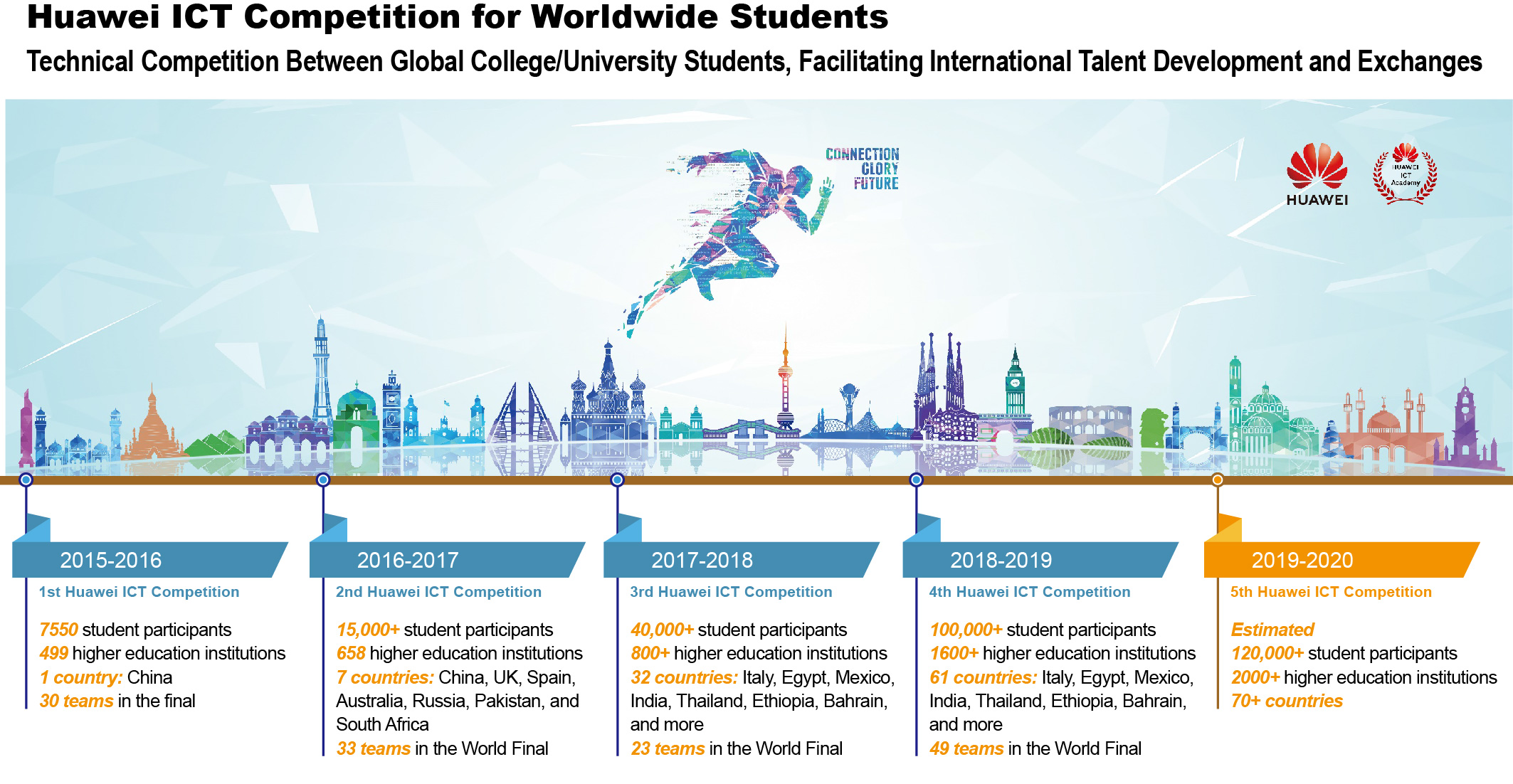Overcoming the Shortage of ICT Talent: Huawei’s Talent Ecosystem Strategy
Enterprise products, solutions & services

Emerging technologies — such as Artificial Intelligence (AI), big data, cloud computing, and the Internet of Things (IoT) — have become crucial for the Information and Communications Technology (ICT) industry as well as the global economy’s wholescale digital transformation. However, the ICT industry’s rapid growth is facing an undeniable challenge: a shortage of high-quality talent.
Growing Pains: A Shortage of High-Quality ICT Talent
In the next two to three decades, technological development will establish an intelligent world where everything is sensing, connected, and intelligent. Before that can happen, however, the ICT industry requires high-quality talent with innovative ideas and technological capabilities. The industry’s future will be driven by such new talent, and those who possess interdisciplinary skills will be highly sought after by large- and small-sized companies alike.
The knowledge-intensive ICT industry relies heavily on its talent — a situation exacerbated by the industry’s explosive growth. For instance, according to the National Bureau of Statistics and Ministry of Education, China needed a staggering 7.65 million ICT professionals in 2017.
Meanwhile, a mismatch between the talent pool’s technical capabilities and the interdisciplinary skills the industry requires is hindering talent recruitment. In other words, the industry lacks highly talented individuals with the innovative capabilities that are essential to drive new growth.
The overall talent shortage is also caused by talent concentration in emerging technologies, such as cloud computing, big data, IoT, and AI. At the same time, companies’ strict employment requirements result in fewer candidates being hired.
The China ICT Talent Ecosystem Whitepaper explains the industry’s current talent recruitment trends. It notes that cloud computing companies are recruiting talent with cloudification service consulting and guidance capabilities. Elsewhere, companies working in the big data field require talent to display data analysis and business intelligence; IoT companies look for talent that is able to apply knowledge and understanding of the technology to multiple scenarios; and AI companies need talent that can foster in-depth industry integration, since AI technology is at its breakthrough stage, with many applications needed to be developed for a wide range of scenarios.
To sustain rapid growth, the industry must answer two key, pressing questions: How can talent be developed to meet the industry’s ever-growing demand? How can the high-quality training of talent be accelerated to meet that demand with the urgency required?
Tackling Talent Shortage: Building a Talent Ecosystem
Huawei prioritizes its talent and their value. Of Huawei’s 188,000 employees, 45 percent are involved in innovation and Research and Development (R&D). Indeed, Huawei is focused on building an open, collaborative, mutually beneficial talent ecosystem, developing ICT talent and facilitating the industry’s growth and transformation. Huawei builds its talent ecosystem by sharing its experience in development, management, and talent cultivation through collaboration with partners, educational institutions, organizations, and government authorities.
Huawei’s talent ecosystem strategy involves setting talent standards, building a talent alliance, and promoting the value of talent.
Huawei Certification provides an industry-leading ICT talent development standard and an overall architecture for certification. Based on the ‘platform + ecosystem’ strategy and ‘cloud-pipe-device’ synergy, Huawei provides ICT Vertical Certification, Platform and Service Certification, and ICT Infrastructure Certification, to personnel who are responsible for technical infrastructure, developers, and end-users. The certification system is divided into three levels — Associate, Professional, and Expert — based on previous experience and technical requirements.
Huawei Certification covers many industry domains, providing talent with clear career development pathways and proper evaluation standards. Over the past two years, more and more certifications have been released — covering cloud computing, cloud service, big data, IoT, AI, intelligent computing, AI-native database GaussDB, and Kunpeng processors — and all have gained widespread industry recognition.
In total the Huawei Certification program has released 100 certification exams, covering 22 technical categories. With this program, Huawei certified more than 250,000 professionals from around the world by the end of 2019, providing great benefits to customers and partners alike.
Talent development is challenging and time-consuming. It requires both dedication and heavy investment to build a talent ecosystem that can thrive. And partners are essential to establishing the success of the ecosystem.
Huawei has actively been expanding its partnerships and deepening the collaboration between enterprise and education. It has partnered with more than 900 universities and colleges around the world — including Polytech Nice Sophia (France), Henley Business School (UK), the University of Malaya (Malaysia), the University of Alicante (Spain), and Shanghai Jiao Tong University (China) — providing teaching materials, training, lab construction, and student certification to more than 45,000 students every year.
Meanwhile, Huawei cooperates with global training partners to provide training and certification services for professionals worldwide, in order to sustain talent supply. By the end of 2019, more than 110 Huawei Authorized Learning Partners (HALPs) had been developed around the world, with 4,700 Huawei certification exam centers located in 183 countries and regions.
Huawei also works with partners to accelerate talent cultivation and address the talent shortage in emerging technology domains. Huawei has collaborated with partners to establish the AI Talent Development Program, for example, addressing the AI domain’s talent shortage. More than 10,000 students are expected to obtain Huawei Certified ICT Associate-Artificial Intelligence (HCIA-AI) certification through Huawei ICT Academies within three years.
Similarly, Huawei is addressing the big data domain’s talent shortage, working with global partners and higher education institutions with the aim of training more than 10,000 certified big data experts within three years. Meanwhile, Huawei has also been developing the Kunpeng computing industry by releasing the Kunpeng Talent Program, with the aim of cultivating more than 200,000 professionals in technical fields such as using Kunpeng processors and GaussDB, intelligent computing, and AI, all within five years.
Teaching materials play a fundamental role in the construction of the ICT talent ecosystem. Huawei has been coordinating well-known professors, in-house technical experts, and publishing editors since 2018, to jointly publish a series of training materials, which focus on technological evolution and industry development. Nine big data textbooks were launched in 2018, and 12 IoT textbooks and eight AI textbooks will be published in 2020.
Huawei holds many international ICT competitions — to help talent showcase their technical capabilities and to foster the exchange of ideas with industry leaders. Huawei aims to build an environment that encourages learning, promotes development, and boosts talent value. Huawei ICT Competition 2018–2019, held in May 2019, attracted more than 100,000 students from over 1,600 universities and colleges in 61 countries. The Huawei ICT Competition 2019–2020 will likely surpass these figures, with more than 130,000 participants expected to attend from over 70 countries.
Huawei has also released the end-to-end Huawei Talent Platform to provide a better experience for various types of global users. The platform helps learners to improve their capabilities and assists them with career development by offering a one-stop service, covering registration, learning, online course purchase, examination, certification, and job seeking.
Huawei understands that the ultimate goal of talent development is long-term employment. To this end, Huawei organizes online and offline job fairs to match the right talent with the right enterprise. This way, talent supply is streamlined and enterprises receive individuals with the skill sets they need.

The talent ecosystem is the cornerstone for the ‘platform + ecosystem’ strategy, where people are the most important part of the ecosystem and the foundation for maintaining the vitality and continuous growth of the industry chain. Huawei hopes to tackle the ICT industry’s severe talent deficiency by developing standards, building alliances, and communicating talent value. By 2024, Huawei expects to have built a vibrant ICT talent ecosystem and developed more than one million industry professionals.
Furthermore, Huawei is putting more effort into ensuring equal, high-quality education. In doing so, Huawei aims to achieve the goal of the TECH4ALL digital inclusion initiative — to help more people benefit from digital technology than ever before.